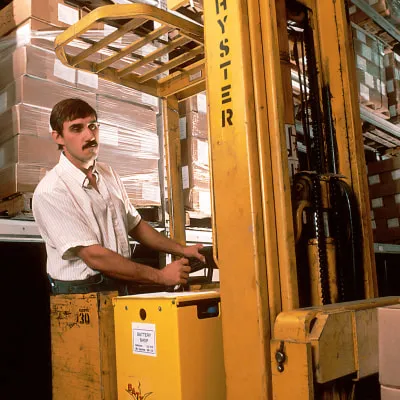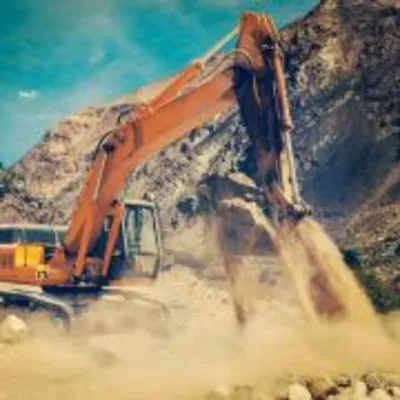Free Online Construction Courses and Certifications 2024
Construction is a field of science that focuses on the design, planning, and building of structures. It involves a wide range of knowledge, from mathematics and physics to engineering and architecture. With the help of online courses, students can learn the fundamentals of construction and gain the skills necessary to become a successful professional in the field. From understanding the basics of building materials to mastering the latest construction technologies, online courses provide a comprehensive education in the science of construction.
Popular Courses
You will learn how to inspect the forklift before use, how to safely maneuver and travel with a load, and how to handle and secure the load.
By the end of the course, you will have the knowledge and skills to safely and effectively operate a forklift.
Learn MoreThis Crash Course of Golang is designed to give you a comprehensive introduction to the Go programming language. You will learn the fundamentals of the language, including variables, data types, control structures, functions, and more. You will also learn how to use the language to create applications and web services. By the end of the course, you will have a solid understanding of the language and be able to write programs in Go.
Learn MoreThis course, A Life of Happiness and Fulfillment, will explore the determinants of a happy and fulfilling life. Drawing from psychology, neuroscience, and behavioral decision theory, this course will provide a tested and practical recipe for leading a life of happiness and fulfillment. Through lectures, guest appearances, and exercises, students will gain a deeper understanding of the science of happiness and be able to implement the “7 Habits of the Highly Happy” in their own lives.
Learn MoreThis course will provide an overview of the hazards and best practices associated with compressed gases and pressure washers. It will cover topics such as the safe handling of compressed gases, the proper use of pressure washers, and the potential risks associated with their use. Participants will learn how to identify and mitigate risks, as well as how to properly maintain and store compressed gases and pressure washers. The course will also provide guidance on the selection of appropriate safety equipment and the proper use of protective clothing.
Learn MoreThis course provides an introduction to basic rigging. Students will learn how to select the right lifting accessories, hitch types, and how to communicate with crane operators. Through lectures, demonstrations, and hands-on activities, students will gain an understanding of the principles of rigging and the importance of safety. They will also learn how to inspect and maintain rigging equipment, and how to properly use slings and other lifting devices. By the end of the course, students will have the knowledge and skills to safely and effectively rig loads for lifting.
Learn MoreThis course is perfect for those interested in sports marketing, sports administration, the MLB, and American culture & globalization. It provides an in-depth look at American history through the lens of baseball, exploring the game's impact on the nation's culture and globalization. Learners will gain an understanding of the history of the game, its evolution, and its influence on American culture. The four courses will track American history and baseball history side-by-side, providing a comprehensive overview of the game's impact on the nation.
Learn MoreThis course evaluates the medieval history of Toledo from the 6th to the 11th centuries, exploring the cultural and religious transformations of the city. We will virtually tour Islamic and Christian structures, examine the Visigoths transition to Catholicism, and explore Islamic governance and development. We will study King Alfonso “The Wise” and his efforts to characterize himself as the “king of three religions”. We will also evaluate the robust Jewish and converso noble families of the city and appreciate their intellectual, religious, and economic contributions to Castilian life. We will bear witness to the rise of anti-Jewish blood purity statutes, the creation of the Inquisition, and the expulsion of the Jews. We will also introduce and study Spanish manuscripts from the municipal and cathedral archives. No knowledge of Spanish is needed to participate in the course.
Learn MoreThis course will explore the differences between residential and commercial safety standards. We will discuss the various construction methods used in each type of building and the regulations that must be met in order to ensure safety. We will also look at how to meet the safety standards required for both residential and commercial buildings. By the end of the course, you will have a better understanding of the differences between residential and commercial safety standards and how to meet them.
Learn MoreThis course provides an overview of the OSHA Fall Protection in Construction standard and the Focus Four Hazards series. It covers the requirements of the standard, the reasons behind them, and how to identify and prevent fall hazards. It also provides information on the use of personal fall protection systems, guardrails, safety nets, and other fall protection measures. Participants will gain an understanding of the importance of fall protection and how to ensure compliance with the standard.
Learn MoreThis course will provide an overview of excavation and trenching safety. It will cover topics such as the importance of proper planning, the use of protective systems, and the recognition of hazardous conditions. Participants will learn how to identify potential hazards, how to properly inspect the work area, and how to use the right equipment for the job. The course will also provide guidance on how to respond to emergencies and how to properly document the work. With this knowledge, participants will be better prepared to safely and effectively complete excavation and trenching projects.
Learn MoreThis course will provide an overview of the OSHA Focus Four Hazards Caught In or Between Hazards. It will define these hazards, describe how to protect against them, and explain an employer's responsibilities toward employee protection. Participants will learn about the common causes of caught-in or -between hazards, such as unguarded machinery, falling objects, and improper use of tools. They will also learn how to identify and control these hazards, as well as how to create a safe work environment. Finally, the course will discuss an employer's responsibility to provide a safe workplace and the importance of training employees on safety protocols.
Learn MoreThis course will provide an overview of ladder safety and how to minimise risk while using a ladder. Participants will learn about the different types of ladders, how to inspect and maintain them, and the proper techniques for using them. They will also learn about the safety regulations and guidelines for ladder use, as well as how to identify and avoid potential hazards. By the end of the course, participants will have a better understanding of how to use ladders safely and effectively.
Learn MoreThis course will provide an overview of the hazards associated with working in confined spaces and the safety measures that must be taken to protect workers. It will cover topics such as identifying confined spaces, assessing the risks, and implementing safety protocols. Participants will learn how to recognize and avoid potential hazards, as well as how to respond in the event of an emergency.
Learn MoreYou will also learn about the safety regulations and procedures that must be followed when operating a crane or hoist. This includes the proper use of personal protective equipment, the importance of pre-operation inspections, and the proper use of hand signals.
By the end of the course, you will have a better understanding of the safety protocols and regulations that must be followed when operating a crane or hoist. You will also have the knowledge and skills to safely and efficiently operate a crane or hoist in a manufacturing environment.
Learn MoreYou will gain an understanding of the importance of personal protective equipment (PPE) and how to use it correctly. You will also learn how to identify and respond to potential hazards, and how to safely operate machinery and equipment.
You will be equipped with the knowledge and skills to protect yourself and your colleagues against the hazards associated with workplace machines and equipment.
Learn MoreThis Driver Safety course provides an overview of the risks associated with driving and how to reduce them. It covers topics such as defensive driving, vehicle maintenance, and the importance of following traffic laws. It also provides strategies for dealing with hazardous road conditions and how to respond to emergency situations. The course also covers the importance of proper vehicle inspection and maintenance, as well as the importance of driver safety training. Participants will gain the knowledge and skills necessary to become a safe and responsible driver.
Learn More Construction Courses
Career Trends
Career Prospects
| Average Salary | Position Overview
|
| Project Manager | $62,326 per year
| A Project Manager is responsible for organizing, planning, and executing projects within limitations such as budgets and schedules. They lead entire teams, establish project goals, communicate with stakeholders, and oversee projects until their completion. |
| Construction Manager | $74,115 per year | Construction Managers, also known as General Contractors or Project Managers, are responsible for overseeing and coordinating a range of projects, such as constructing public, residential, commercial, and industrial structures, as well as roads and bridges. |
| Superintendent | $90,303 per year | The Superintendent works towards promoting the success of all students and assists the Board of Trustees in maintaining a learning-focused environment in the district. |
| Project Engineer | $80,110 per year | A Project Engineer is a professional who oversees all technical and engineering aspects of their assigned projects. They plan, schedule, forecast, and manage all technical tasks for the project to ensure accuracy, proper allocation of resources, and quality throughout the project's lifecycle. |
| Field Engineer | $62,203 per year | Field Engineers are responsible for a range of duties, including inspecting and installing equipment and new technologies, directing on-site crews or workers, conducting research, and reporting on the status of the project. They ensure that all operations run smoothly, engineering designs are followed, and project objectives are met. |
Educational Paths
1. Associate's degree in Construction Management or Construction Technology.
2. Bachelor's degree in Construction Management, Civil Engineering, or Architecture.
3. Apprenticeship programs offered by trade unions and construction companies.
4. Vocational or technical schools that offer training in specific construction trades, such as carpentry, electrical work, or plumbing.
5. Online courses and certification programs offered by industry associations such as the Associated General Contractors of America (AGC) or the Construction Management Association of America (CMAA).
Frequently Asked Questions and Answers
Q1: Which universities offer an online degree in construction engineering?
Online construction engineering degrees are offered by a number of universities, including the University of Washington, Iowa State University College of Engineering, and Northern Arizona University's College of Engineering and Natural Sciences. The University of Washington offers an online civil engineering graduate program with a focus in construction engineering, while Iowa State University College of Engineering offers a Bachelor of Science in Construction Engineering. Northern Arizona University's College of Engineering and Natural Sciences offers a Bachelor of Science in Construction Management. All three universities provide students with the opportunity to gain the knowledge and skills necessary to pursue a career in construction engineering.
Q2: What does construction mean?
Construction, also known as building construction, encompasses the techniques and industry related to the assembly and erection of structures, particularly those designed to offer shelter. This age-old human activity originated from the fundamental necessity of creating a controlled environment to mitigate the impact of climate.
Q3: What is a construction project?
A construction project involves a intricate network of construction contracts and various legal obligations, which necessitate careful consideration from all parties involved. The exchange of a set of obligations between two or more parties, known as a contract, establishes a framework for addressing and managing issues within the project.
Q4: What Construction courses can I find on AZ Class?
On this page, we have collected free or certified 174 Construction online courses from various platforms. The list currently only displays up to 50 items. If you have other needs, please contact us.
Q5: Can I learn Construction for free?
Yes, If you don’t know Construction, we recommend that you try free online courses, some of which offer certification (please refer to the latest list on the webpage as the standard). Wish you a good online learning experience!
















